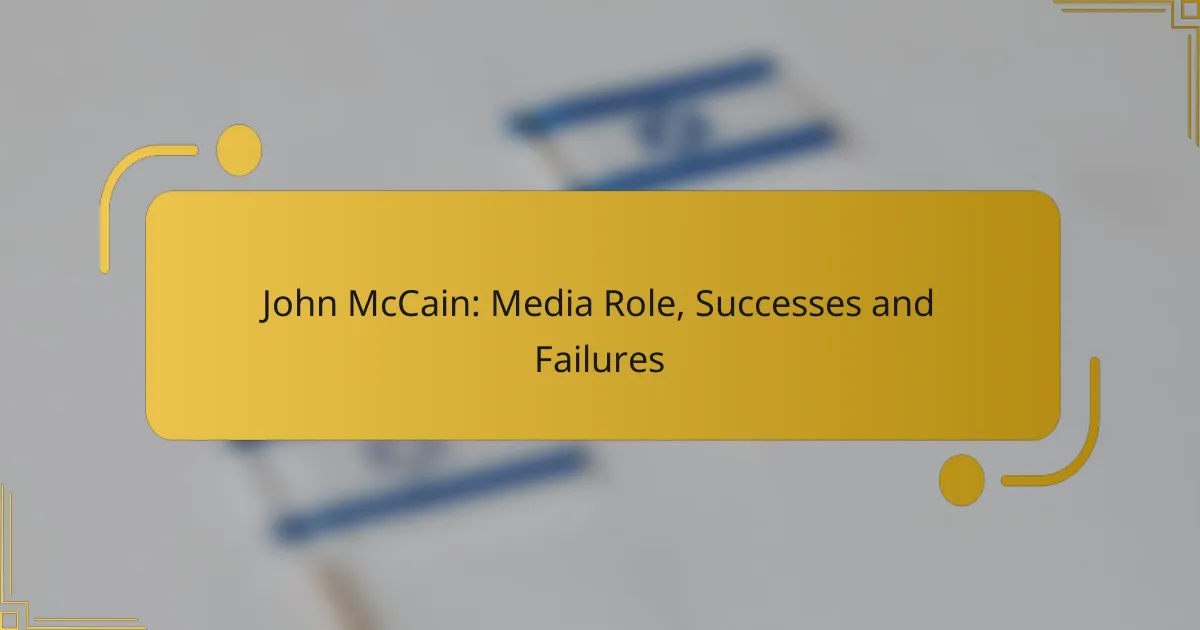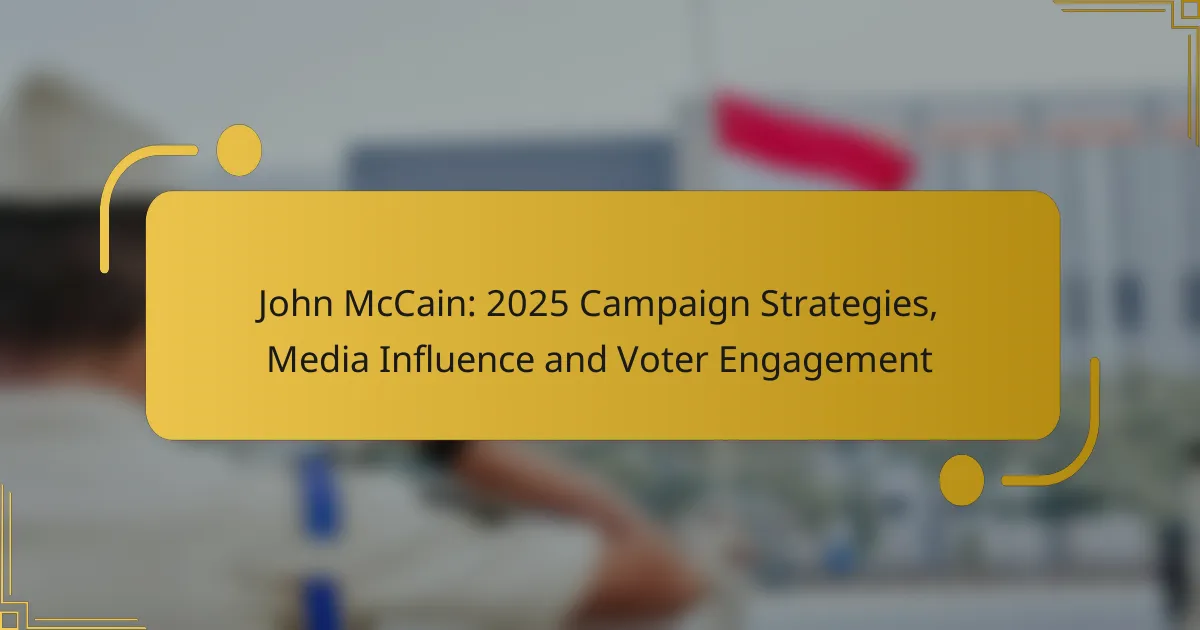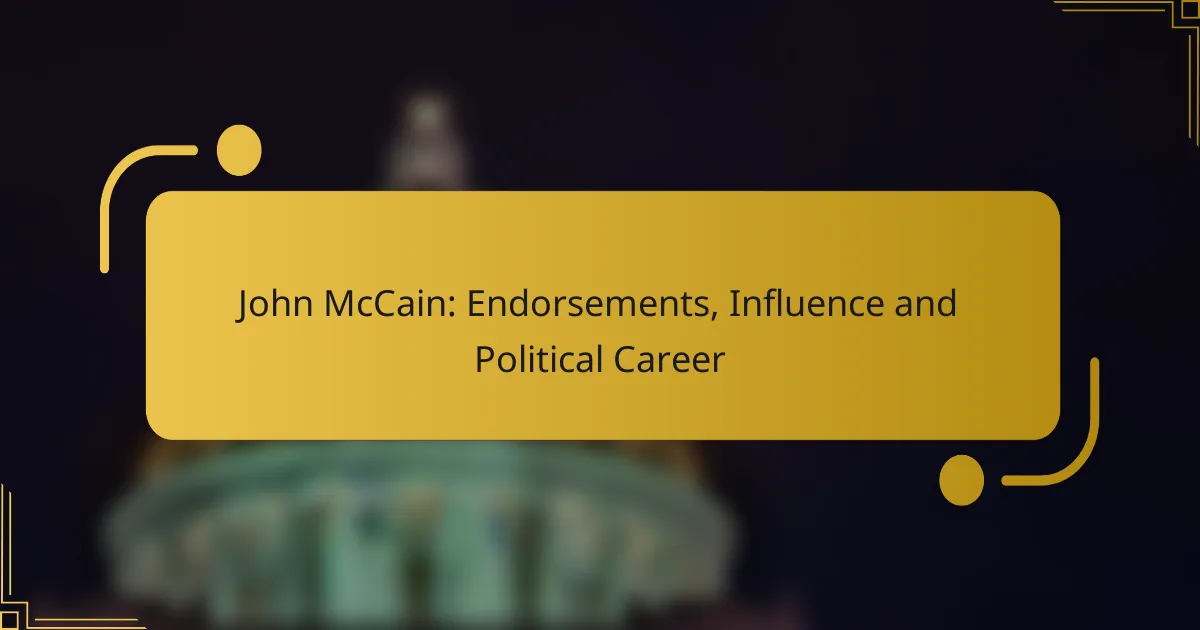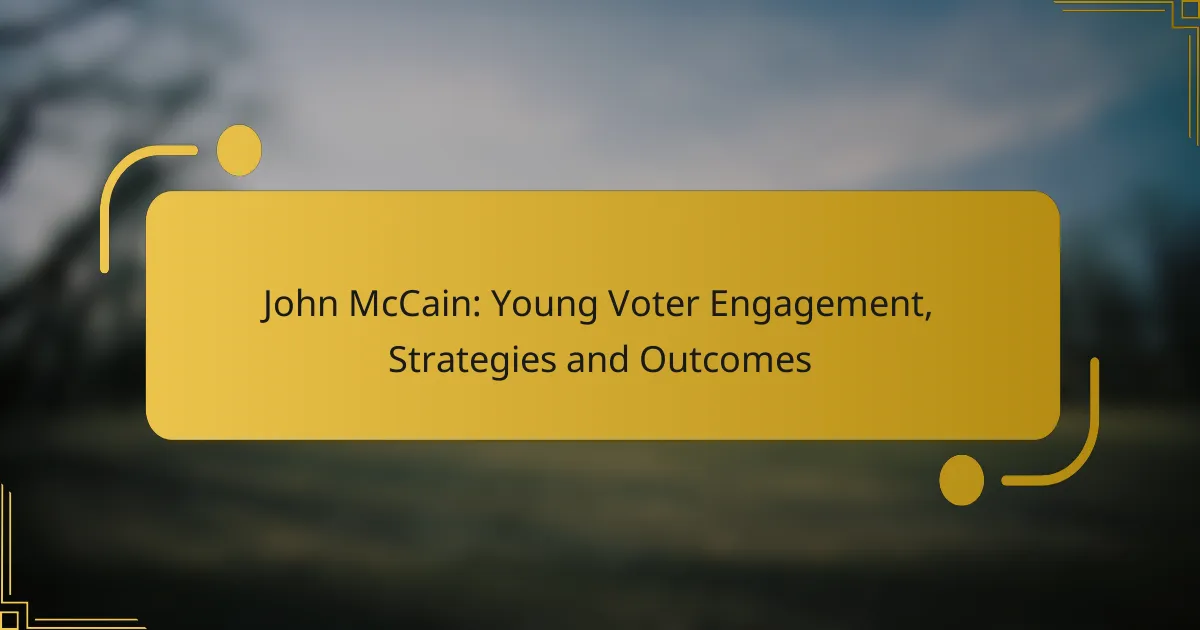John McCain was a prominent figure in the media landscape, serving as a U.S. Senator, presidential candidate, and political commentator. His ability to engage with the public through social platforms and compelling speeches helped shape discourse, especially on foreign policy. However, McCain also encountered significant challenges, including controversial remarks and campaign missteps that affected his public image and political trajectory.
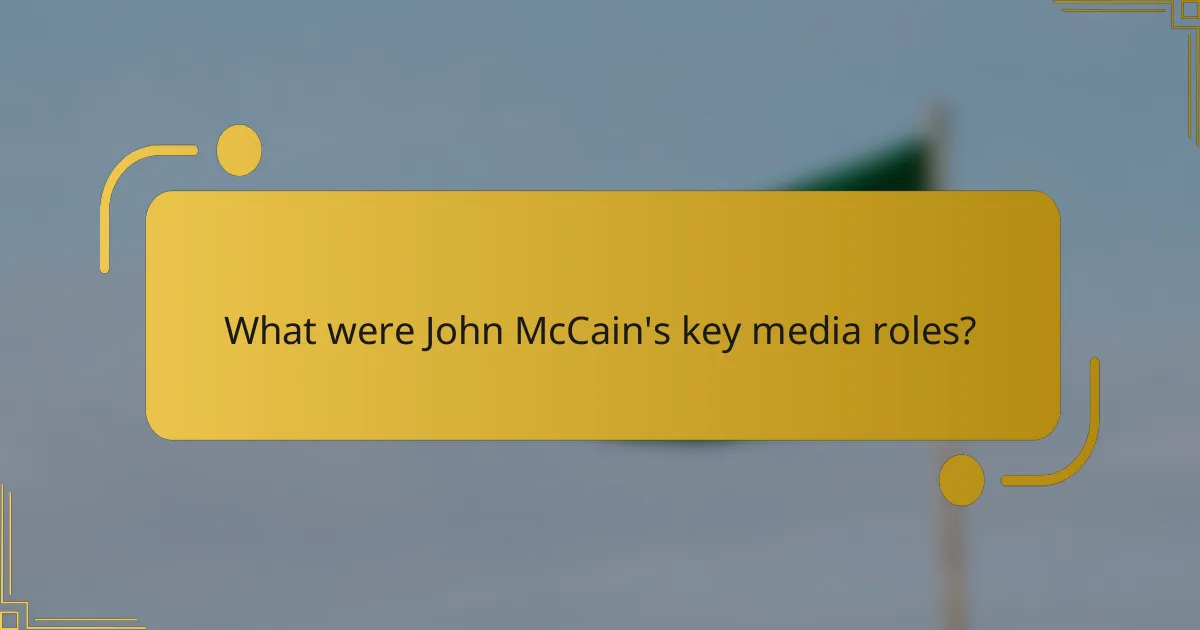
What were John McCain’s key media roles?
John McCain played significant roles in media as a U.S. Senator, a presidential candidate, and a political commentator. His influence extended beyond politics into shaping public discourse, particularly on foreign policy issues.
Senator and Presidential Candidate
As a Senator from Arizona, John McCain was known for his candid communication style and willingness to engage with the media. His presidential campaigns, particularly in 2000 and 2008, showcased his ability to connect with voters through televised debates and interviews.
During these campaigns, McCain often addressed key issues such as healthcare, national security, and economic reform, which resonated with a broad audience. His reputation as a “maverick” allowed him to attract both traditional Republican voters and independents.
Political Commentator
After his political career, McCain transitioned into a role as a political commentator, frequently appearing on news networks to provide insights on current events. His experience in the Senate and as a presidential candidate gave him a unique perspective on political dynamics.
McCain’s commentary was characterized by a focus on bipartisanship and a commitment to principles over party loyalty. He often emphasized the importance of civility in political discourse, which resonated with many viewers seeking a more constructive dialogue.
Influencer on Foreign Policy
John McCain was a prominent voice in shaping U.S. foreign policy, advocating for a strong military presence and active engagement in global affairs. His media appearances often highlighted his views on international relations, particularly regarding conflicts in the Middle East and relations with Russia.
Through interviews and public speeches, McCain pushed for policies that supported democracy and human rights abroad. His stance on foreign policy issues influenced both public opinion and legislative actions, making him a key figure in discussions about America’s role on the world stage.
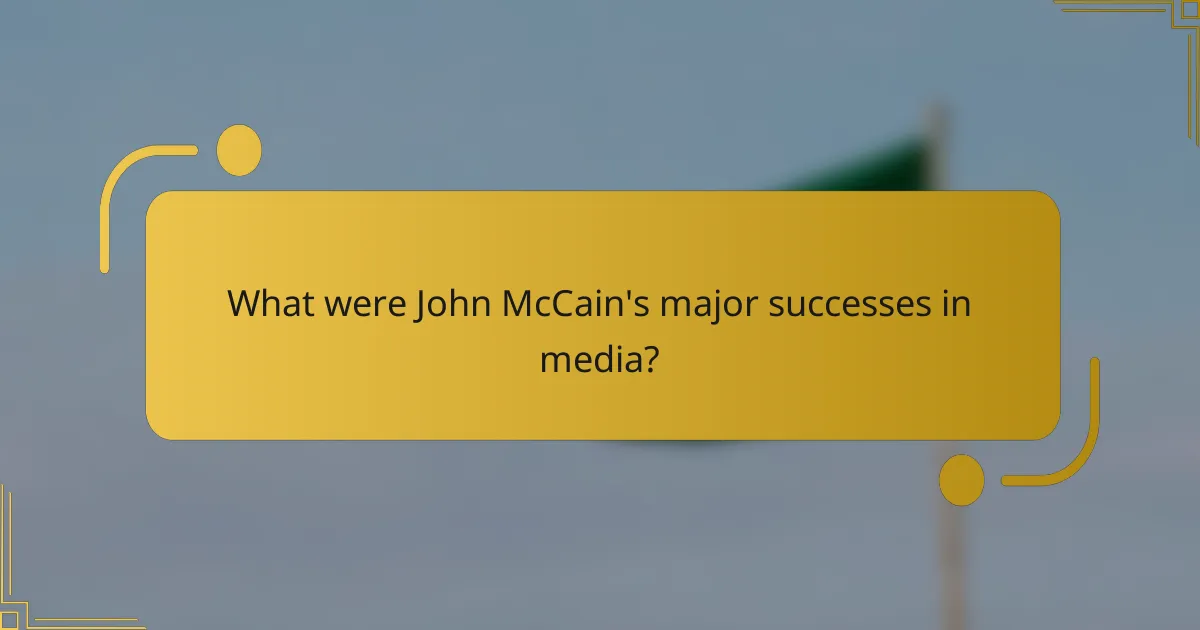
What were John McCain’s major successes in media?
John McCain’s major successes in media included his adept use of social platforms, strong public speaking abilities, and impactful interviews and debates. These elements contributed significantly to his public persona and political influence.
Effective Use of Social Media
John McCain effectively utilized social media to engage with voters and share his message. He was one of the early adopters among politicians, using platforms like Twitter and Facebook to communicate directly with the public, bypassing traditional media filters.
His social media strategy included sharing personal stories, responding to constituents, and addressing current events in real-time. This approach helped him connect with younger voters and maintain relevance in a rapidly changing media landscape.
Strong Public Speaking Skills
McCain was known for his compelling public speaking skills, which he used to convey his political vision and connect emotionally with audiences. His ability to articulate complex issues in an accessible manner made him a formidable presence at rallies and town hall meetings.
He often employed storytelling techniques, drawing on his personal experiences and military background to resonate with listeners. This authenticity helped him build trust and credibility among supporters.
Influential Interviews and Debates
John McCain’s interviews and debates were pivotal in shaping his public image and political narrative. He approached these platforms with a combination of honesty and assertiveness, often addressing tough questions head-on.
His performance in presidential debates, particularly in 2008, showcased his experience and knowledge, allowing him to stand out against opponents. McCain’s willingness to engage in candid discussions about controversial topics earned him respect, even from critics.
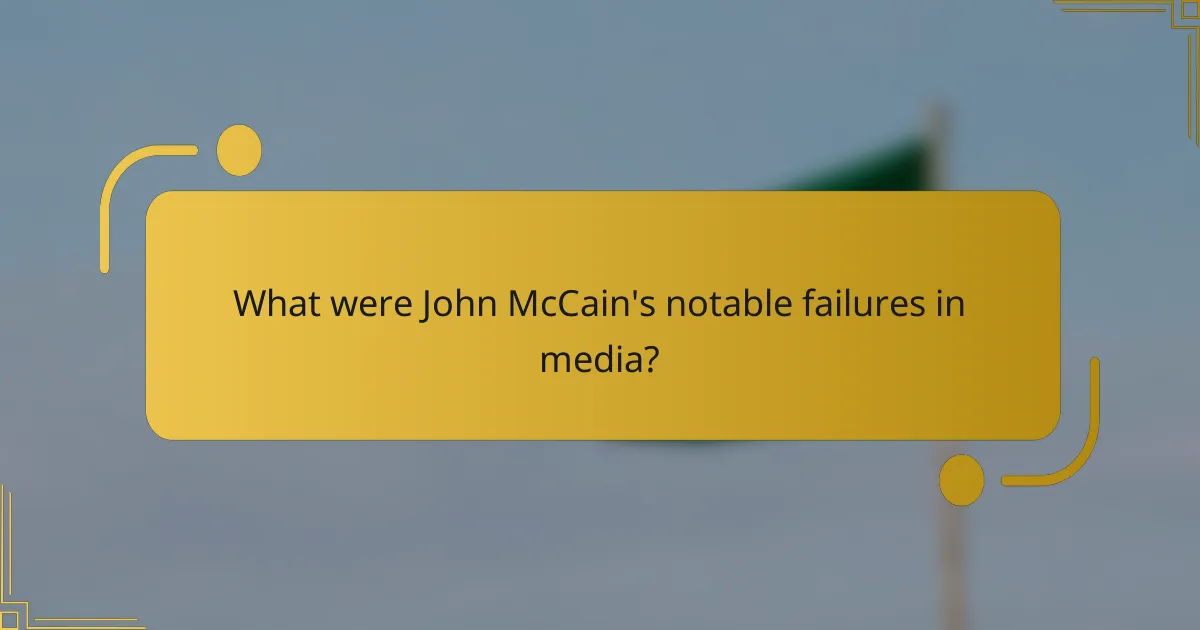
What were John McCain’s notable failures in media?
John McCain faced several notable failures in media that impacted his public perception and political campaigns. These failures included controversial statements, missteps in campaign messaging, and challenges in managing media relations.
Controversial Statements
McCain’s career included several controversial statements that drew significant media attention and criticism. For instance, his remarks about the “whackos” in the Republican Party alienated some conservative voters, while his comments on immigration reform often sparked backlash from various voter groups.
These statements sometimes overshadowed his policy proposals and led to negative media coverage, affecting his image as a unifying candidate.
Missteps in Campaign Messaging
During his presidential campaigns, McCain struggled with consistent messaging, which often confused voters. For example, his shifting stances on key issues like healthcare and tax reform created uncertainty about his positions, making it difficult for the media to portray a clear narrative.
Additionally, his campaign’s failure to effectively counter misinformation contributed to a lack of trust among potential supporters, undermining his overall messaging strategy.
Media Relations Challenges
McCain’s relationship with the media was often tumultuous, marked by both cooperation and conflict. While he had a reputation for being accessible to journalists, there were instances where he clashed with reporters over coverage, particularly regarding his military service and personal life.
These challenges sometimes resulted in negative portrayals in the press, which could have been mitigated with more strategic media engagement and clearer communication of his message.
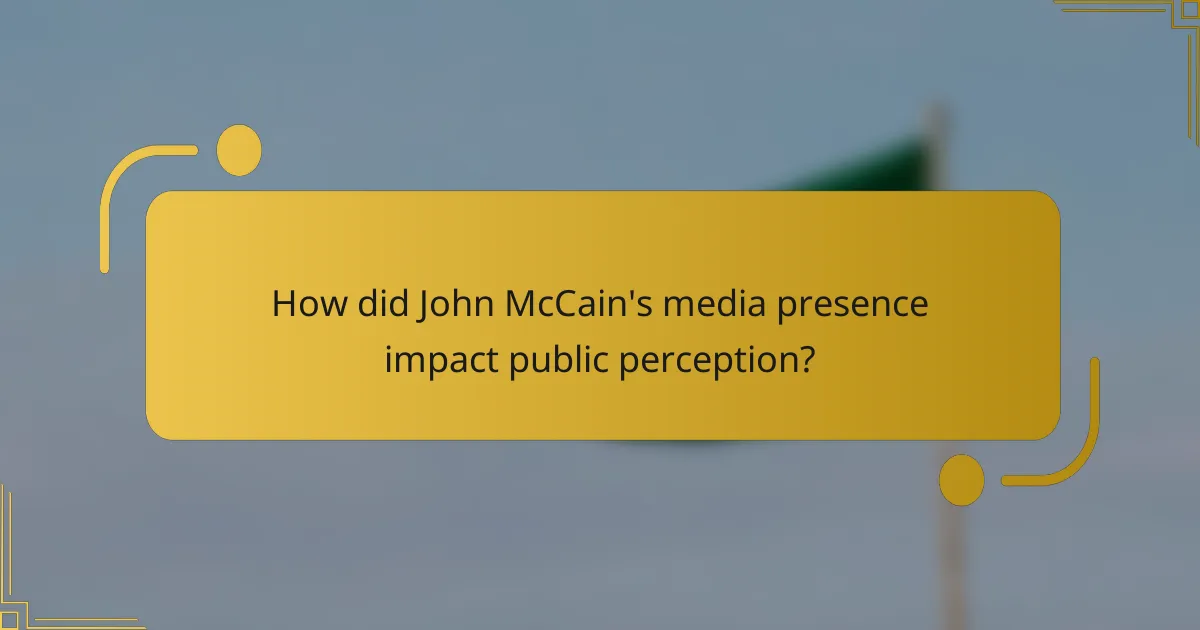
How did John McCain’s media presence impact public perception?
John McCain’s media presence significantly shaped public perception by enhancing his image as a principled leader and a maverick. His ability to engage with the media allowed him to communicate directly with voters, influencing their opinions and attitudes toward his policies and candidacy.
Shaped Voter Opinions
McCain’s media presence played a crucial role in shaping voter opinions, particularly during his presidential campaigns. He often utilized television interviews and town hall meetings to connect with the electorate, presenting himself as a relatable candidate. This approach helped him garner support from various demographics, including independents and moderate voters.
His candidness on issues like immigration and foreign policy resonated with many, allowing voters to see him as a leader who was willing to tackle difficult topics head-on. This strategy not only built trust but also differentiated him from his opponents.
Influenced Media Coverage
McCain’s relationship with the media was complex but influential. He was adept at leveraging media coverage to his advantage, often using press appearances to frame narratives that aligned with his campaign goals. His reputation as a war hero and his willingness to speak candidly about controversial issues ensured that he received significant media attention.
However, this relationship also had its pitfalls, as negative coverage could quickly arise from his more controversial statements or actions. McCain’s ability to navigate these challenges often determined the tone of media narratives surrounding him.
Created Lasting Legacy
John McCain’s media presence has left a lasting legacy on American politics, particularly in how candidates engage with the press and the public. His approach to media relations set a precedent for future politicians, emphasizing the importance of authenticity and direct communication.
Moreover, his willingness to address contentious issues openly has encouraged a more transparent political discourse, influencing how subsequent candidates approach media interactions. McCain’s legacy continues to impact public expectations of political leaders and their media engagement strategies.
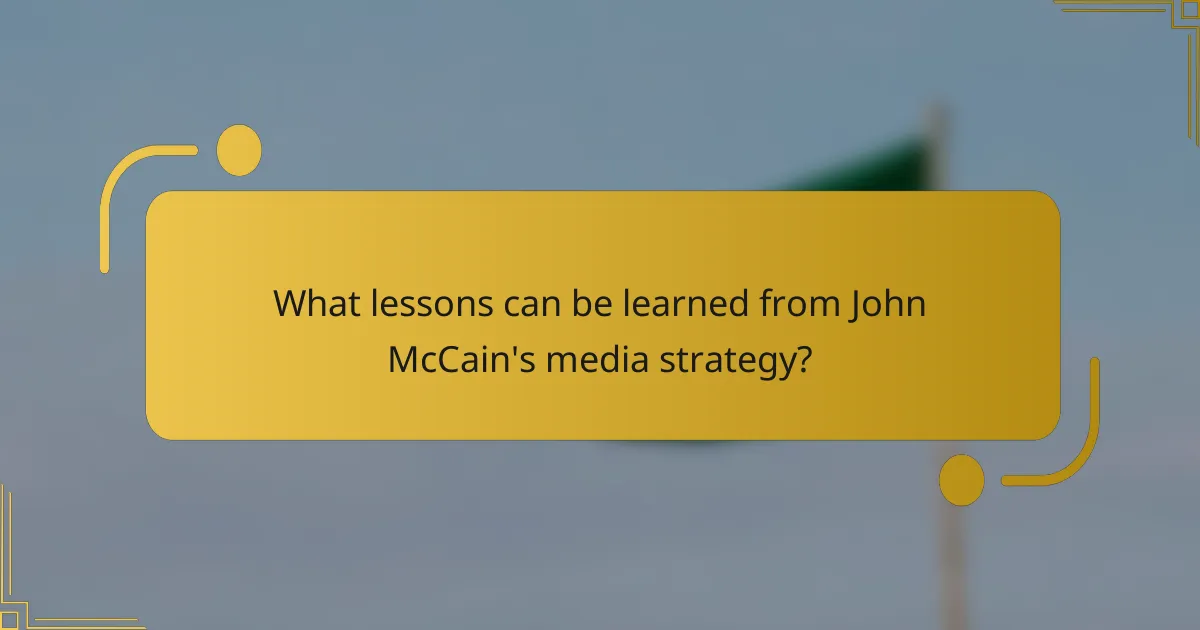
What lessons can be learned from John McCain’s media strategy?
John McCain’s media strategy highlights the significance of authenticity and consistent messaging in political communication. His approach demonstrates that being genuine and maintaining a clear, unified message can effectively engage voters and build trust.
Importance of Authenticity
Authenticity in media strategy fosters a genuine connection with the audience. McCain’s candidness about his beliefs and experiences resonated with many voters, making him relatable and trustworthy. This connection is crucial in a political landscape where skepticism is common.
To cultivate authenticity, politicians should share personal stories and be transparent about their positions. Engaging with constituents through town halls or social media can enhance this perception. Avoiding scripted responses and showing vulnerability can further strengthen this bond.
Need for Consistent Messaging
Consistent messaging ensures that a political figure’s stance is clear and recognizable. McCain’s ability to maintain a steady narrative throughout his campaigns helped reinforce his identity and values. This clarity can prevent confusion among voters and solidify support.
To achieve consistent messaging, candidates should develop key talking points and stick to them across various platforms. Regularly updating these points to reflect current events while keeping the core message intact is essential. Avoiding mixed signals or contradictory statements is crucial to maintaining credibility.
